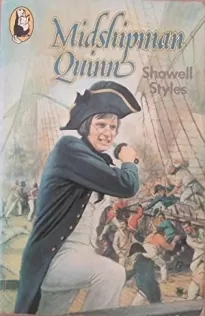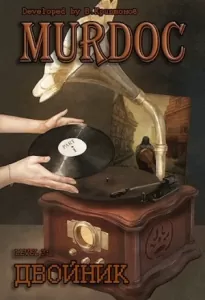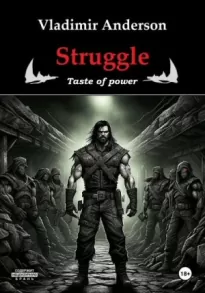Midshipman Quinn

- Автор: Showell Styles
- Жанр: Исторические приключения / Морские приключения
- Дата выхода: 1956
Читать книгу "Midshipman Quinn"
— 1 —
OUT OF THE flat blue of the Mediterranean rose a sunlit yellow cliff a thousand feet high, so mighty a precipice that the frigate moving past its base with her dazzling white sails spread looked like a tiny toy. Gibraltar. The guardian fortress of a great sea two thousand miles long whose coastline was all in the powerful hands of Napoleon Bonaparte or trembling in fear of him.
Midshipman Quinn, standing at the rail of His Majesty's frigate Althea to watch the famous "Rock" fall astern as she sailed eastward, smiled grimly to himself as he thought of Napoleon Bonaparte, dictator of all Europe, ruling a nation three times the size of Britain but quite unable to prevent a British frigate from entering that great sea — because that guardian fortress was not French or Spanish but British. He told this thought to Midshipman the Honourable Charles Barry, who was standing beside him.
"Boney would give his ears for Gib, I'll wager," drawled Barry. "And if it wasn't for us, Sep — the Navy — we couldn't keep Gib, you know. I wonder," he added, glancing towards the quarterdeck where Captain Sainsbury and his First Lieutenant paced in conversation, "I wonder what our orders are."
Everyone aboard Althea — except her captain — had been wondering that ever since she left Portsmouth fourteen days ago.
"Cocker thinks we are to join Lord Nelson off Toulon," said Septimus.
"That's because Fitz has set his heart on fighting under Nelson. He wants broadsides and cutlass-waving and plenty of — of blood and thunder."
Charles Barry spoke the words lightly, but there was an odd note in his voice — almost as if he disliked saying them. Septimus Quinn glanced quickly at him. Since the junior midshipman's rescue of Tad Beamish in mid-air, Barry and he had got to know each other rather better. Fitzroy Cocker still treated Septimus as he considered a large senior midshipman ought to treat a small junior one — with scorn and insult — but Barry had conceived a sincere respect for the younger boy's courage. Septimus liked him in spite of his rather spiritless bearing and drawling speech, and he had discovered some time ago that Barry had some secret trouble on his mind.
Barry met his glance and looked away. Then he turned to gaze with worried eyes at his brother midshipman. They were as nearly alone as any two people could be in the confined space of a ship-of-war.
"See here, Sep," he said in a low voice, "I'd like to tell you something. I've been wanting to tell someone for a long time. I'm afraid."
"Afraid?" repeated Septimus, half-wondering whether he was joking. "And pray, Charles, what are you afraid of?"
"Fighting — death — wounds," Barry said hurriedly. "Oh, I know it's a deuced awful thing to confess, but it's true. I've kept it to myself until now, and I'm only telling you because I know you won't make fun of me. I don't know what to do about it."
Mr. Quinn groped in the pocket of his blue uniform coat and got out his spectacle-case. It was a habit he had when confronted with a serious problem, and he had hooked the steel-rimmed glasses over one ear before he realised what he was about and hastily put them back again.
"But, Charles," he said, frowning, "we have so far seen no fighting. You can't be afraid of something you've never seen."
"Yes, you can. At least, I can. I'm a coward, Sep — that's what it amounts to. I lie awake at night sweating to think how I might behave when we go into action. I'm not like Fitz, looking forward to getting to grips with the French, you see."
Septimus thought this out for a moment. Then he looked up to nod reassuringly at his friend.
"In short, Charles," he said in that grave manner which Fitzroy Cocker and Lieutenant George Pyke found so infuriating, "you are afraid — of being afraid. That doesn't make you a coward. Pray don't distress yourself by thinking along those lines. When the time for action comes I shall be quite as nervous as you, I assure you. The only thing to do—"
His sage advice was cut short by the lusty squealing of the bosun's pipes calling All hands!
As he trotted aft towards the quarterdeck, with the barefooted seamen scurrying past him to form their divisions, Septimus was still frowning. He was troubled about his friend's confession.
Captain Sainsbury stood erect with hands linked behind him, looking down at the rows of brown faces in front of him. Every officer and man of the Althea's complement of two hundred was waiting to hear what he had to say, except the few who could not be spared from the handling of the frigate. He raised his harsh voice so that it carried to the rearmost man.
"I want you all to understand that the Navy has many tasks to perform. We have been given a special task. It is unlikely to bring us much glory, and we may not take a single prize. This vessel is ordered to cruise independently along the French coast between Port Vendres and the Hyeres Islands, with the object of bringing back information about the disposition of French forces along that coast. "
He paused. A slight rustle of movement ran along the ranks of seamen — hardly to be called a whispering, for no one spoke. It was the only sign of their disappointment.
"In the course of this main task," resumed Captain Sainsbury as gravely as ever, "we shall be forced to maintain close contact with the coast, along which a number of vessels — enemy vessels — are still plying their trade. It would not, I am sure, be the intention of Their Lordships at the Admiralty that these vessels should be allowed to reach their destination if we fall in with them. "
Again he paused, and this time the brown faces were grinning and here and there a deep chuckle sounded as someone tumbled to it that there would, after all, be enemy ships to capture and booty to be won. Midshipman Barry did not look particularly happy as he returned Midshipman Quinn's surreptitious wink.
"However," the captain was saying, "we shall not allow the chances of prize-taking to distract us from our duty, which is to discover all we can about Bonaparte's defences. That will mean landing-parties in enemy territory. We shall be striking a very harmful blow at the Frogs with every item of information we bring back, and if we can also find opportunity to destroy some of Boney's property — well, we'll not waste that opportunity."
The men were all grinning widely now, and a voice piped up: "Good old Saint! That's the med'cine for Boney!"
"I will flog the next man that raises his voice without orders," said Captain Sainsbury without altering a muscle of his lean face. "Ours is no easy task, and without proper discipline we shall not carry it through. I rely on every officer and man to do his duty. Mr. Pyke, you may dismiss the men to their quarters."
Pyke's bull voice roared the dismissal. Septimus and Charles Barry went down to the midshipmen's berth, where they found Mr. Midshipman Cocker preparing to go on deck for signal duty on the quarterdeck. Beneath his red hair the face of the big senior midshipman was sullen.
"Well, Fitz," Barry greeted him, "you heard our fate, I presume?
Lord Nelson isn't to have the honour of our company after all."
"The worse for us, demme!" Cocker burst out, ramming his hat on defiantly. "Prowling along the coast, snapping up defenceless trading-ships — where's the glory in that?"
"Nevertheless," remarked Septimus mildly, "our cruise may be a good deal more useful to England than half-a-dozen single-ship engagements. "
"Pah! May be — and may be not!" Fitzroy Cocker strode angrily towards the companion-ladder. At the foot of it he paused, ducking his head under the low deck-beams, to glare back at them. "It's my belief," he growled, "that you're glad there's a chance of saving your precious skin, young lickspittle — you too, Charles!"
He ran up the ladder. Charles Barry, whose face had flushed dark red, turned to Septimus.
"What d'you think he meant by that?" he demanded. "Sep, suppose he knows how I feel! Suppose he starts spreading the tale that I'm—"
"Pray don't distress yourself, Charles," interrupted the junior midshipman. "Our friend Fitz has the habit of speaking without thought. Just now he is angry and disappointed. His words meant nothing. "
But Barry would not be reassured. His fear of being a coward was beginning to prey on his nerves, Septimus reflected. The sooner Charles Barry had a chance of proving to himself that he could conquer fear, the better.
It was to be several days before that chance came. The Althea sailed steadily over the blue sea-miles of the Mediterranean with a favourable wind to speed her, keeping the coast of Spain just out of sight on her larboard beam. Spain, although she was in league with the Dictator of Europe, was not actively at war with Britain, and when (as happened twice) the frigate sighted a Spanish ship she merely displayed her colours and held on her course.
Those few days were not spent idly on board the Althea. The gun-crews were continually exercised under the supervision of Lieutenant Gifford, the second officer. The sails and rigging were overhauled piece by piece. Lieutenant Pyke exercised the seamen aloft whenever he got the chance, and the midshipmen were in turn put in charge of boat-lowering practice under conditions of absolute silence. Mr. Pyke had not been as active in finding fault with Septimus since the midshipman's rescue of Tod Beamish. His red face still wore a scowl whenever his eye fell on Mr. Quinn, however. Septimus suspected that Captain Sainsbury had spoken to the First Lieutenant about the unwisdom of sending junior midshipmen to the masthead during a gale, and he realised that if this was so he would be even less popular with Mr. Pyke than before. "Lobsterface" was the sort of man who would bear a grudge even against a boy of half his own age.
Young Mr. Quinn did not let this worry him. The summer days at sea in the blue Mediterranean, and the prospect of excitement to come, kept him reasonably happy. It was on the fourth day after leaving Gibraltar that he became aware of a certain tenseness in the manner of everyone on board the Althea. The frigate had passed the latitude of the Pyrenees, and was entering the Gulf of Lions. No longer was there a neutral shore on her beam — she was cruising off the south coast of France, the arch-enemy of England, and gradually closing in towards enemy territory.
That night, an hour after sunset, Gifford, the Second Lieutenant, put his round pleasant face into the gun-room where the three midshipmen had just finished their supper.
"You're wanted in the main cabin, gentlemen," he said with a smile. "The captain's called a conference — and I think it'll be a council of war."
The main cabin was in the extreme stern of the ship, not a very large room but a well-lit one, for a wide stern-window with lockers under it looked out above the big wooden rudder. Tonight it was lit by a large oil-lamp swinging from the low beams overhead. Captain Sainsbury and his three lieutenants were seated at the small table, and the midshipmen sat on the lockers in the window. The captain, as usual, wasted no time in preliminaries.
"We are about to commence operations, gentlemen," he said, looking round the six intent faces. "Port Vendres, and the town of Perpignan further inland, are just over the horizon. It is almost certain that the French have garrisons in both places, and there may be ships of war in Port Vendres harbour. I wish to find out for certain."
He flattened out a large chart that lay on the table in front of him, and beckoned the midshipmen to come forward so that they could see it.
"This curve of coast is all sandy beach," he explained. "Here is Port Vendres, strongly fortified. The guns of that fort will be twenty-pounders at least — probably heavier. We cannot hope to get near the port without being observed and blown out of the water before our own guns are in range. Here — ten miles to the north and inland from the coast — you see Perpignan, a large fortified town. Our map is incomplete, but there must be a road connecting the two. Probably it runs along the coast some little distance from the shore. There will be a considerable amount of traffic along that road between two fortified towns."
He leaned back from the chart and once more looked at his officers.
"I want prisoners," he continued. "At the same time, I wish to try and keep Althea's presence on this coast from becoming known to the French. I have called you all to this council, but only three officers will be needed for this landing operation, which will be a small one."
"I wish to volunteer," barked Lieutenant Pyke at once. "Thank you, Mr. Pyke. I must ask you, however, to let me choose on this occasion. Mr. Gifford will command the whole operation, for which I shall send the launch and the cutter. Mr. Barry will be in command of the launch, with Mr. Quinn to second him."
He looked up inquiringly as a muffled sound between a snort and a gurgle came from Midshipman Cocker, but that young gentleman was sitting with his mouth tightly shut and an expression of angry disappointment on his face. The captain went on with his explanation.
"I shall leave the details of organisation to Mr. Gifford, but I want these orders observed. One of the two boats is to land two miles north of Port Vendres, the other two miles south of the mouth of the River Tet, on which Perpignan stands. The landings will thus be about six miles apart along the coast. The boats will put off tomorrow night from Althea, who will stand by six miles offshore. Since I wish to keep the frigate below the horizon, I shall not be able to support the landings. Is that clear?"
Lieutenant Gifford leaned forward. "I take it, sir," he said, "that our best plan will be to get into position near the road before dawn, and then—"
"You are in command, Mr. Gifford," interrupted Captain Sainsbury. "How you capture your men is your business. I suggest, however, that each party should bring back one prisoner only, and that such prisoner should if possible be a man who can tell us something about the military situation ashore. You will remember that army patrols and convoys use that road. I rely on your proved discretion to avoid any fighting, of course. But if you find it possible to take a French officer — well, that might be worth a skirmish."





